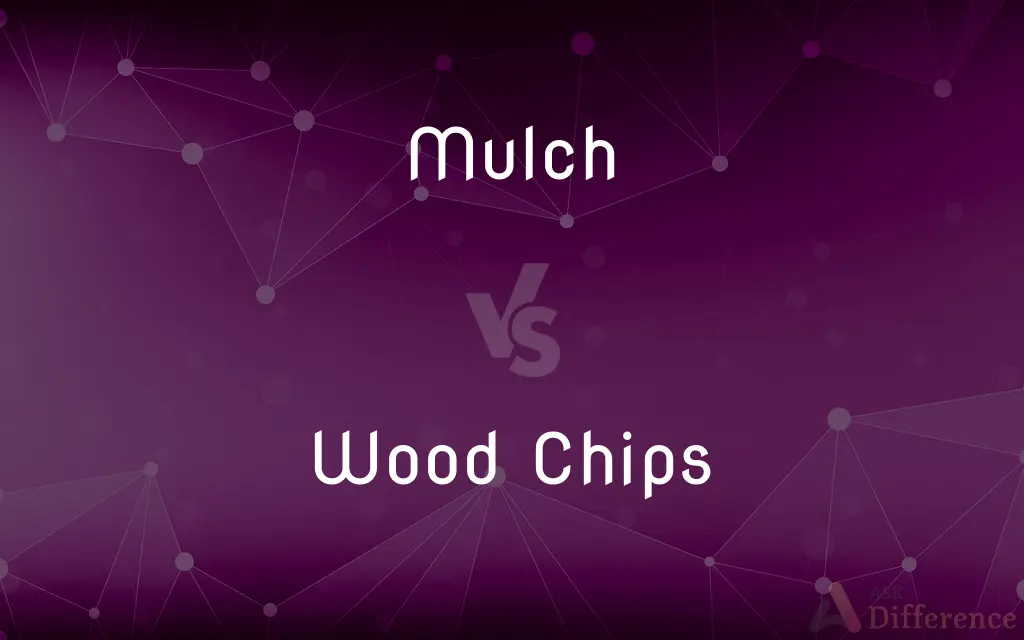Mulch vs. Wood Chips — What's the Difference?
Edited by Tayyaba Rehman — By Fiza Rafique — Published on March 1, 2024
Mulch is a broad category of materials applied to soil surfaces to retain moisture and suppress weeds, whereas wood chips, a type of mulch, specifically come from chipped tree branches, offering organic benefits and aesthetic appeal.

Difference Between Mulch and Wood Chips
Table of Contents
ADVERTISEMENT
Key Differences
Mulch encompasses a variety of organic and inorganic materials used to cover the soil in gardens and landscapes. Its primary purposes include moisture retention, temperature regulation, weed suppression, and aesthetic enhancement. Organic mulches, such as straw, bark, and compost, break down over time, enriching the soil with nutrients. Inorganic mulches, like rubber or stones, offer longer-lasting ground cover without improving soil fertility.
Wood chips, a subset of organic mulches, are specifically made from chipped or shredded branches, trunks, and other parts of trees. They are favored for their natural look, ability to suppress weeds, and gradual contribution of nutrients to the soil as they decompose.
Both serve to protect and enhance soil, while wood chips are particularly valued for their role in permaculture and organic gardening. Their decomposition process fosters a healthy ecosystem for soil microbes and worms, enhancing soil structure and fertility over time. However, wood chips may not be suitable for all plants, especially those requiring more nitrogen, as their decomposition can temporarily reduce the nitrogen available to plants.
The choice between wood chips and other mulch types often depends on specific gardening goals, aesthetic preferences, and the needs of the plants being cultivated. Wood chips can be particularly effective in areas around trees and shrubs, where they mimic the natural forest floor and support a healthy root environment. Other mulches might be chosen for their specific benefits, such as the heat retention of black plastic mulch in vegetable gardens or the immediate soil improvement offered by compost.
In terms of application, wood chips are generally applied more thickly than some other organic mulches, which can help them last longer but also means they take longer to break down and enrich the soil. This slow decomposition makes wood chips ideal for paths and perennial beds but less so for annual gardens where soil is disturbed regularly. Care must be taken with any mulch to avoid direct contact with plant stems and tree trunks to prevent rot and pest issues.
ADVERTISEMENT
Comparison Chart
Types
Organic (straw, bark, compost) and inorganic (stones, rubber)
Specifically chipped tree branches and trunks
Benefits
Moisture retention, weed suppression, soil temperature regulation, aesthetic improvement
Adds organic matter, suppresses weeds, retains moisture, provides a natural look
Decomposition
Varies by type; some enrich soil quickly, others do not decompose
Slow decomposition, gradually enriches soil with nutrients
Suitable For
Wide range of garden types and needs
Best for trees, shrubs, perennials, and paths
Nutrient Impact
Depends on material; organic types can add nutrients quickly
Can temporarily lock up nitrogen as they break down
Application Thickness
Depends on type; generally thinner for faster-decomposing materials
Applied thicker, lasting longer but decomposing slowly
Aesthetic Appeal
Varies widely based on material choice
Natural, forest-floor appearance
Compare with Definitions
Mulch
A protective layer spread over soil to conserve moisture and improve fertility.
She applied a layer of mulch to the vegetable garden to retain moisture.
Wood Chips
Slow to decompose, offering long-lasting ground cover.
The wood chips remained effective as mulch for several seasons without needing replacement.
Mulch
Can be organic or inorganic, each with unique benefits.
For his pathways, he chose inorganic mulch to avoid annual replacement.
Wood Chips
Suitable for mulching around trees, shrubs, and perennial beds.
She used wood chips in the shrub border for a tidy, natural appearance.
Mulch
Helps suppress weeds and regulate soil temperature.
The mulch in her flower beds kept the weeds at bay throughout the summer.
Wood Chips
Chipped or shredded parts of trees used as organic mulch.
Wood chips were spread around the base of the apple trees to suppress weeds.
Mulch
Often used to enhance the aesthetic appeal of gardens.
The dark mulch contrasted beautifully with her colorful perennials.
Wood Chips
Provide a natural look while improving soil structure as they decompose.
The wood chips on the pathway slowly broke down, enriching the soil beneath.
Mulch
Requires periodic replenishment as organic materials decompose.
He added fresh mulch to his garden beds each spring to replenish nutrients.
Wood Chips
May temporarily reduce soil nitrogen availability during decomposition.
He avoided using wood chips near his vegetable seedlings due to potential nitrogen depletion.
Mulch
A protective covering, as of bark chips, straw, or plastic sheeting, placed on the ground around plants to suppress weed growth, retain soil moisture, or prevent freezing of roots.
Wood Chips
Plural of wood-chip
Mulch
To cover or surround with mulch.
Mulch
Any material used to cover the top layer of soil to protect, insulate, or decorate it, or to discourage weeds or retain moisture.
An organic mulch is a mulch made of natural substances such as leaves or grass clippings.
Mulch
Half-rotten straw, or any similar light, porous, organic substance strewn on the ground, as over the roots of plants, to protect from heat, drought, etc., and to hinder weed growth and preserve moisture.
Mulch
A protective covering of rotting vegetable matter spread to reduce evaporation and soil erosion
Mulch
Cover with mulch;
Mulch the flowerbeds
Common Curiosities
What are the main benefits of using mulch in gardens?
Mulch conserves soil moisture, suppresses weeds, regulates soil temperature, and can improve soil fertility and garden aesthetics.
How often should mulch be replaced?
Organic mulches need replacement as they decompose, usually annually or biennially; inorganic mulches last longer but do not improve soil health.
Why choose wood chips over other types of mulch?
Wood chips are ideal for creating a natural look, lasting longer, and gradually improving soil structure and fertility as they decompose.
Can I use mulch in my potted plants?
Yes, a thin layer of mulch can be beneficial in potted plants for retaining moisture and reducing weed growth, just be sure to leave some space around the plant stem to prevent rot.
Can I use fresh wood chips as mulch?
Fresh wood chips can be used, but they may temporarily lock up nitrogen in the soil as they begin to decompose, so it's often recommended to let them age before use.
Are colored mulches safe to use in gardens?
Colored mulches are generally safe as they use iron oxide for red mulches and carbon black for black mulches, both of which are non-toxic. However, some prefer natural mulches to avoid any risk of chemicals.
Do inorganic mulches improve soil health?
Inorganic mulches do not improve soil health as organic mulches do, but they can be effective for weed suppression and moisture retention.
What is the best time of year to apply mulch or wood chips?
The best time to apply mulch or wood chips is in late spring after the soil has warmed up, which helps retain moisture during the summer months, or in fall to protect over winter.
Can mulch or wood chips be used on slopes for erosion control?
Yes, both mulch and wood chips are effective at reducing erosion on slopes by slowing water runoff and helping to stabilize the soil.
Can wood chips harm plants?
If applied too close to plant stems or in excess, wood chips can cause moisture retention against stems, leading to rot, and may temporarily reduce soil nitrogen.
Are wood chips suitable for vegetable gardens?
While beneficial for soil health, wood chips are best used in pathways or around perennials in vegetable gardens due to their slow decomposition and potential nitrogen depletion.
Do wood chips attract pests?
When applied properly, wood chips do not typically attract more pests than other mulches, but care should be taken to avoid direct wood-to-stem contact.
How thick should I apply wood chips?
Wood chips are typically applied 2-4 inches thick, which is thicker than many other organic mulches to maximize their benefits and longevity.
How do I choose between organic and inorganic mulch?
Consider your garden's needs: organic mulch improves soil health as it decomposes, while inorganic mulch lasts longer and is often used for decorative purposes.
How can I prevent mold and fungi from growing in my mulch or wood chips?
Ensuring proper ventilation and avoiding overly thick layers can prevent mold and fungi growth. Also, occasionally stirring the mulch can help keep it dry and aerated.
Share Your Discovery

Previous Comparison
BFA vs. MFA
Next Comparison
Inspection Chamber vs. ManholeAuthor Spotlight
Written by
Fiza RafiqueFiza Rafique is a skilled content writer at AskDifference.com, where she meticulously refines and enhances written pieces. Drawing from her vast editorial expertise, Fiza ensures clarity, accuracy, and precision in every article. Passionate about language, she continually seeks to elevate the quality of content for readers worldwide.
Edited by
Tayyaba RehmanTayyaba Rehman is a distinguished writer, currently serving as a primary contributor to askdifference.com. As a researcher in semantics and etymology, Tayyaba's passion for the complexity of languages and their distinctions has found a perfect home on the platform. Tayyaba delves into the intricacies of language, distinguishing between commonly confused words and phrases, thereby providing clarity for readers worldwide.
















































